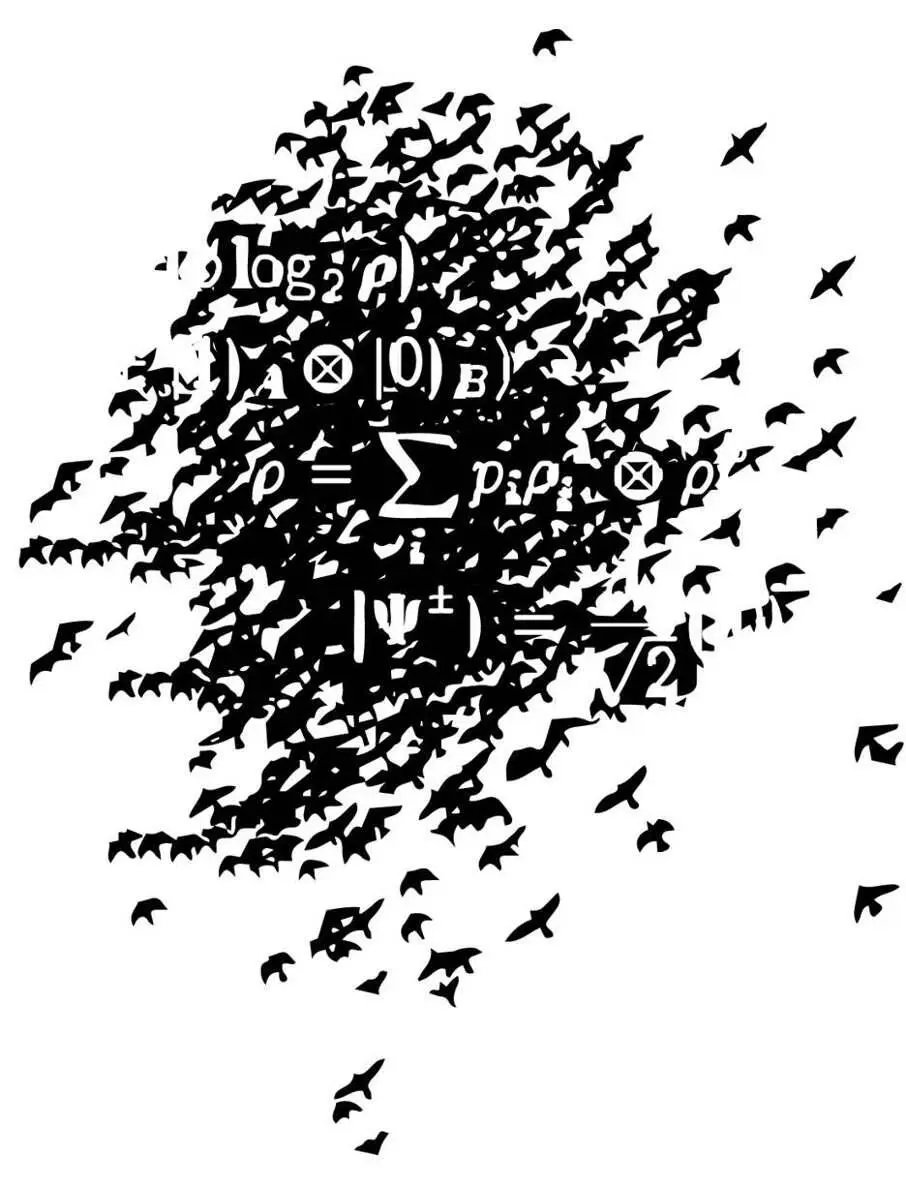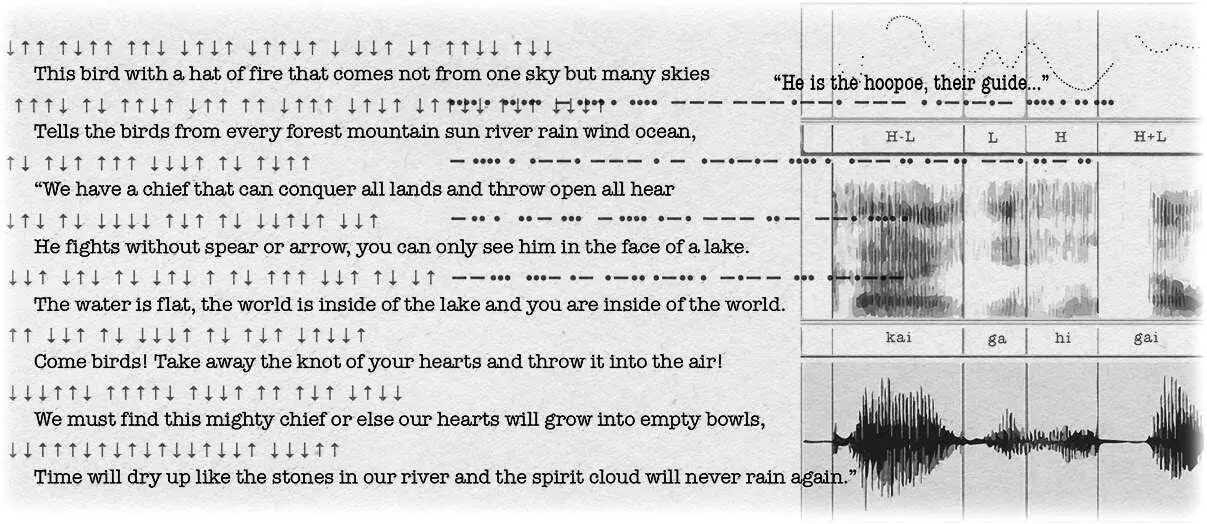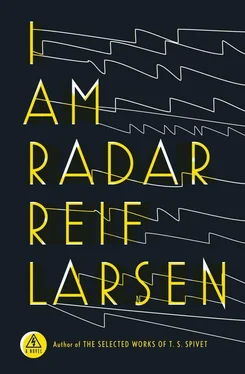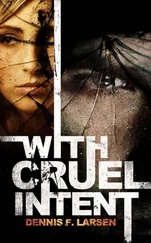“I don’t know that many phrases in Kele. I only went to drumming club for one year.”
“It doesn’t matter. Use the words you have. That’s all we can ever do. Radar will fill in the gaps with Morse code, yes? But I want people to hear the story before they see it. I want people to feel it before they know what it is. Radar, you’ll do the equations as well. I’ve got them here.”
• • •
THEY PRACTICED. They practiced that day and the next. Radar worked his radios, scrabbling up sequence, tapping out code. His stage-left station became an elaborate array of Morse bugs, keyboards, speakers, cables, and shortwave radios. Otik finally got the vircator up and running, and the birds leaped off the barge and began to fly again, first in pairs, then in groups of four, and finally in great swarms. Lars set up a projector that sent out images of diagrams and equations. In the evening, as the birds flew across the beams of light, you could see snippets of these equations come to life, the bodies of the birds a flickering canvas that would materialize out of thin air like wisps of smoke. Occasionally, actual birds would come to investigate the swarm, perhaps thinking there was a school of fish to feed on, but after a moment of confusion, in which they would recognize something familiar in the strange puppet forms and yet also sense the distinct shroud of otherness, these living birds would lose interest and fly on.

Fig. 5.6. “Projected Flock Equations”
From Radmanovic, R. (2013), I Am Radar, p. 620
Meanwhile, Horeb was studying the text of Attar’s poem, working out the words and phrases, taking breaks only to sleep, eat, and pray. With his limited vocabulary on the drum, he did his best to translate the story of the birds into music, his beats intertwining with the Morse code beeps until the two of them had developed a sonic rapport that wove open the night:

Fig. 5.7. “Conference of the Birds, Drum/Morse/Radio Palimpsest”
From Radmanovic, R. (2013), I Am Radar, p. 621
As darkness fell on the river, the pousser would slow and they would search out a calm area where they could shelter for the night. Their barge would soon be surrounded by men in pirogues offering fish, dead monkeys lashed to sticks, baby crocodiles, cassava, reed baskets filled with squirming fluorescent caterpillars. And books. Books and books and books. As in the first village from which they had launched, everywhere they went these neatly wrapped books were paddled out and offered to Funes, who emerged from his pousseur to receive them, foot braced against the bow railing, hands extended as if he were a king surveying his domain.
That first night on the river, one of the villagers, after spotting the theater wagon on the barge, asked Horeb what it was for.
“A performance,” Horeb said in Lingala. “These men have come from across the ocean to put on a performance.”
The villagers interpreted this to mean that the performance was meant for them. Word spread through the village, and soon everyone was on the beach, ready for the show.
Radar looked over at Lars.
“What do you think?” Lars asked as they gathered in conference.
“They are waiting. They will be pleased,” said Horeb.
“Seems okay to me,” said Radar.
“We see it as public rehearsal,” said Otik. “We don’t get too upset. We don’t get mad.”
“It’s not traditionally what we do,” said Lars.
“What is tradition? Shitty rules made by shitty people,” said Otik.
“A debatable point, but I see what you mean,” said Lars.
They assumed their positions: Horeb at the drums, Radar at his console, Otik at the vircator, Lars with the lights, the projector, and the hand crank for the scrolling backdrops and the shadow puppets. The show began in total darkness, and then the lights rose across a barren desert and they were off. The shadow puppet of the hoopoe appeared, and then the birds — great swarms of birds encircling him, encircling the boat, the village, everything. A barrage of drumbeats announced their entrance. Radar found a radio station of a man humming to himself — he could not imagine who this was or where this man must be humming, but there it was, and there it was now on the stage.
Hmmm hmmmm hhmmmmm.
Radar listened to the drum, nodding his head, and then he began to tap out code on the Morse bug. As they had before, Horeb and Radar slipped into mutual understanding. Not that Radar could tell exactly what Horeb was saying with his drum, but he knew without knowing as he introduced another radio signal, this one full of static and what sounded like a sermon. He tapped his key alongside Horeb’s drum, as if they were strolling down a path together. For a moment, everything meshed perfectly. The birds overhead, thousands of wings engulfing them, flashing into the light, melting, everyone listening to the hoopoe’s story. The villagers oohing and laughing as the projectors lit up wing and beak, equations dissolving and evolving. Desert melted into the first valley, the Valley of the Quest, and the backdrop scrolled, then suddenly a light fizzled and popped. There was a shower of sparks on the boat, and a clump of birds plummeted out of the sky like stones into the river. They heard Otik swear loudly from behind the wagon.
“Cancel this show, cancel this fucking show!” he bellowed. “Stop! Stop! Stop! I hate this motherfucking shit. Nabijem na kurac ove jebene ptice !”
Radar stopped keying and turned off his radios, but Horeb did not stop drumming. Radar looked over at Otik and Lars, knowing they would not take well to this act of insubordination. But then he heard the people. Unlike the crowd the night before, the people of this village seemed to love what they were seeing. They whooped and cried, and several drums were brought out onto the beach and played, and Horeb began to match the beats. As Otik retreated into the container and Lars worked to fix the broken lights, women, men, children began to dance. Leg, hand, limb flashing in the firelight. Whistles of delight, ululations, catcalls, a shiver of chest, a pounding of feet into earth. Circles formed around the best dancers, and above them the birds still flew, diving, dipping, as if egging the people on.
After it was done, they were mobbed by the villagers coming onto the barge, shaking their hands, hugging them, smiling. A crowd of boys came to Radar and touched his radios. He found a station that played some kind of African soukous hip-hop, and the kids all showed him their moves, brushing hands against face, popping shoulders back and forth, jumping onto and off of knees.
Horeb said that they had been invited to meet the chief of the village.
“I don’t want to meet any chief,” said Otik, still toiling away at his vircator.
“It would be rude not to accept this invitation,” said Horeb.
They made their way through the village, lit only by the bright blue glare of the occasional battery-operated fluorescent light. A smell of charcoal and meat cooking. The forest open, breathing around them. In a large mud house they found a man in blue jeans, T-shirt, and a dinner jacket seated at a plastic table. A radio sat on a shelf.
“Bonjour,” he said. “Je suis le chef.”
Horeb spoke with the chief for a long while. Outside, the entire village was watching them through the doorway.
Читать дальше














